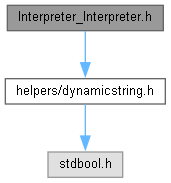Declaration of the Interpreter_Interpret() function used in the Interpreter Pattern. More...
#include "helpers/dynamicstring.h"

Go to the source code of this file.
Macros | |
| #define | __INTERPRETER_INTERPRETER_H__ |
Enumerations | |
| enum | { PERIOD = 100 , QUESTION = 101 , EOL = -1 } |
| Enum to define constants for tokens. More... | |
Functions | |
| bool | Interpreter_Interpret (const int *tokenList, DynamicString *output) |
| This function is a simple interpreter. | |
Detailed Description
Declaration of the Interpreter_Interpret() function used in the Interpreter Pattern.
Definition in file Interpreter_Interpreter.h.
Macro Definition Documentation
◆ __INTERPRETER_INTERPRETER_H__
| #define __INTERPRETER_INTERPRETER_H__ |
Definition at line 8 of file Interpreter_Interpreter.h.
Enumeration Type Documentation
◆ anonymous enum
| anonymous enum |
Enum to define constants for tokens.
| Enumerator | |
|---|---|
| PERIOD | Period. |
| QUESTION | Question mark. |
| EOL | Marker for end of a token list. |
Definition at line 15 of file Interpreter_Interpreter.h.
Function Documentation
◆ Interpreter_Interpret()
| bool Interpreter_Interpret | ( | const int * | tokenList, |
| DynamicString * | output | ||
| ) |
This function is a simple interpreter.
The interpreter takes an array of integer tokens and converts each token into a word or punctuation mark. The interpreter then arranges the words into a space-separated list in a single string. In other words, the tokens are converted into a sentence, with the first word capitalized and no space between the last two "words" under the assumption the last word is actually a punctuation mark.
Interpreter Rules:
- Each token must be in the range of 0 through 39 (maximum number of words known by the interpreter) or must be 100 ('.') or 101 ('?').
- The word corresponding to the first token is always capitalized.
- A single space appears between each word.
- No space appears between the last two tokens.
- Parameters
-
tokenList List of integer tokens to be interpreted. The list is assumed to be terminated by -1 (EOL). output A DynamicString object returning the sentence created through interpreting the tokens. Call DynamicString_Clear() when done with the string.
- Returns
- Returns true if the token list was interpreted successfully; otherwise, returns false, indicating an out of memory condition (or a NULL argument.
Definition at line 117 of file Interpreter_Interpreter.c.
References _InterpretToken(), DynamicString_Append(), EOL, and titlecase().
Referenced by Interpreter_Exercise().